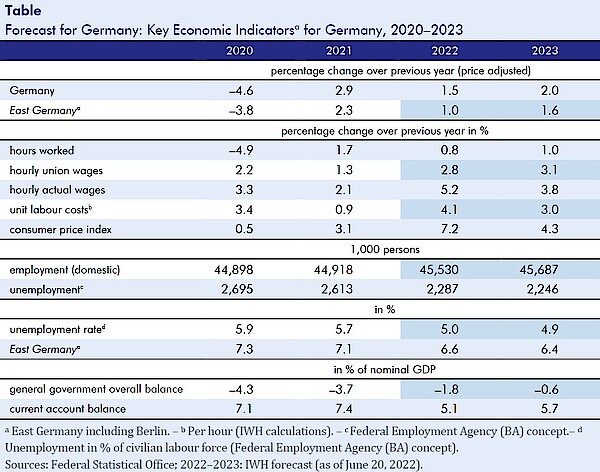War drives up energy prices ‒ High inflation weighs on economy

The global economic recovery was already subdued at the beginning of the year. Over the course of the summer, the global economy remains exposed to various pressures that will cause prices to rise strongly. Further production shutdowns in the wake of China’s zero-covid strategy are likely to temporarily exacerbate shortages of industrial goods and thus fuel inflation worldwide. Additionally, the war in Ukraine gave rise to concerns about the supply of raw materials driving prices higher. The surge in commodity prices leads to a loss of real income and weighs on the demand for goods.
"The economic outlook in Germany is considerably burdened by the war in Ukraine, associated price increases as well as interrupted supply chains," says Oliver Holtemöller, head of the Macroeconomics Department and vice president of the IWH. "These factors diminish the chances of a swift recovery." The summer is expected to prove challenging for the German economy. While the scrapping of nationwide Corona regulations in March provides momentum for some service sectors such as the hospitality industry, consumer sentiment has plummeted with the start of the war in Ukraine, and the inflation rate reached a record pace of 7.9% year-on-year in May 2022. This is likely to dampen private consumption. Conversely, consumption will be supported by the sharp increase in the minimum wage. Fixed capital formation will be adversely affected by the high level of uncertainty due to the war. Government orders accompanying the energy turnaround are likely to have a supportive effect. The limited capacity in the construction industry will continue to be a drag to fixed capital formation. Exports are also likely to weaken in 2022 since new orders have fallen sharply since the start of the year. Unemployment continues to fall, but at a slower pace than before due to the sizable minimum wage increases. "If there are restrictions on economic activity in the winter, the economic recovery is likely to be further delayed," Holtemöller says. The fiscal deficit is expected to decrease in the current year because general government revenues will likely outpace spending. Although public investment is increasing noticeably, subsidies and capital transfers provided are declining as the Corona-related support measures expire.
The long version of the forecast contains two boxes (both in German):
Box 1: Assumptions for the forecast
Box 2: Estimation of potential output
Publication: Drygalla, Andrej; Exß, Franziska; Heinisch, Katja; Holtemöller, Oliver; Kämpfe, Martina; Kozyrev, Boris; Lindner, Axel; Müller, Isabella; Sardone, Alessandro; Scherer, Jan-Christopher; Schultz, Birgit; Staffa, Ruben; Zeddies, Götz: Krieg treibt Energiepreise – Hohe Inflation belastet Konjunktur. IWH, Konjunktur aktuell, Jg. 10 (2), 2022. Halle (Saale) 2022.
Whom to contact
For Researchers

Vice President Department Head
If you have any further questions please contact me.
+49 345 7753-800 Request per E-MailFor Journalists

Internal and External Communications
If you have any further questions please contact me.
+49 345 7753-832 Request per E-MailIWH list of experts
The IWH list of experts provides an overview of IWH research topics and the researchers and scientists in these areas. The relevant experts for the topics listed there can be reached for questions as usual through the IWH Press Office.
Related Publications

Konjunktur aktuell: Krieg treibt Energiepreise – Hohe Inflation belastet Konjunktur
in: Konjunktur aktuell, 2, 2022
Abstract
Die Weltwirtschaft ist auch im Sommerhalbjahr verschiedenen schweren Belastungen ausgesetzt, die die Preise stark steigen lassen. Produktionsstilllegungen im Zuge der chinesischen Null-Covid-Strategie und der Angriff gegen die Ukraine heizen die Inflation weltweit an. Auch in Deutschland wird die konjunkturelle Entwicklung durch die mit dem Krieg verbundenen Preissteigerungen sowie unterbrochene Lieferketten schwer belastet. Die konjunkturellen Aussichten für den Sommer sind trüb. Das deutsche Bruttoinlandsprodukt wird im Jahr 2022 um 1,5% zunehmen. In Ostdeutschland liegt der Zuwachs bei 1%.



